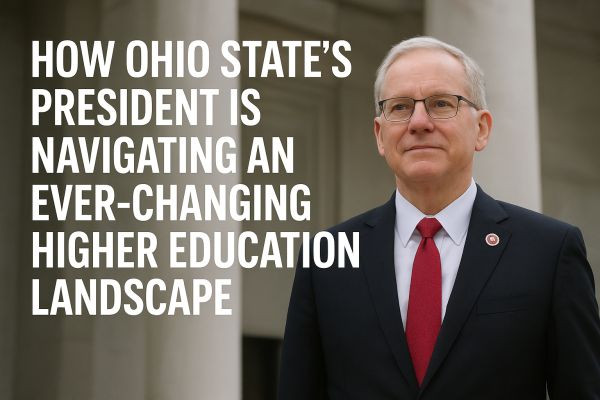Ohio State, one of several schools under federal review for alleged antisemitism on campus, is also facing a separate inquiry into *Project PhD*, a program designed to support minority students pursuing business doctorates. Carter, however, remains unfazed.
“I always tell my staff, if we do the right thing and stay true to our mission, everything will work out,” Carter told *USA TODAY* during a recent visit to Washington, D.C. “So if somebody wants to take a closer look, we welcome that.”
University spokesperson Ben Johnson stressed that Ohio State’s doctoral programs are open to all applicants and the institution “does not discriminate on the basis of race, ethnicity, or any other protected class.”
Carter, who was in the capital to meet with members of Ohio’s congressional delegation and alumni working on Capitol Hill, leads a flagship land-grant university in a deeply conservative state. That political landscape, combined with federal oversight, has placed Ohio State at the heart of debates over academic freedom, diversity, and free speech.
### Balancing Law and Autonomy
Earlier this year, Ohio lawmakers passed Senate Bill 1, a sweeping higher education law that curtails diversity, equity, and inclusion (DEI) initiatives, prohibits faculty strikes, and restricts universities from taking institutional stances on politically charged issues ranging from climate change to abortion.
While some public institutions pushed back, Ohio State did not. Carter explained that outright opposition would have been futile in the face of a Republican supermajority. Instead, he sought to negotiate on provisions, ensuring universities retained some autonomy in how they complied with the law. “It was about having a seat at the table,” he said.
Even so, the university has drawn criticism for closing two diversity centers ahead of the law’s implementation and tightening restrictions on student expression — including chalk messages on sidewalks and resident adviser dorm decorations.
Carter defended the decisions, noting that no student scholarships were lost in the restructuring. He highlighted the creation of the *Buckeye Commons*, which replaced one of the shuttered centers and now provides career, financial, and mental health resources.
On the chalking ban, he argued the issue was more administrative than ideological. Student protests tied to the Israel-Hamas conflict left sidewalks covered with messages that required legal review before removal. “It almost looked like we were endorsing it,” Carter said. “That became a serious administrative burden.”
### Free Speech Under Pressure
The restrictions come at a time of national concern over campus speech. A September 9 report by the Foundation for Individual Rights and Expression ranked Ohio State 124th out of 257 schools in fostering a climate of free expression. Among Ohio State respondents, 43% admitted to self-censoring.
Carter acknowledged the tension but said Ohio State’s policies were designed to strike a balance between expression and order.
### The Debate Over Civic Centers
Meanwhile, the university has launched the *Salmon P. Chase Civic Center*, mandated by a 2023 state law. Such centers — often encouraged by conservative lawmakers — focus on constitutional studies and civic traditions, and are seen by critics as ideological counterweights to DEI programs.
Faculty at Ohio State voted against the center’s creation, though their approval was not required. Carter rejected claims that the center represents a partisan agenda, saying it is meant to foster open, rigorous debate.
“It’s not a forced slant to the conversation,” he said.
As Carter navigates probes from Washington, new state laws in Columbus, and ongoing unrest on campus, his strategy appears to rest on pragmatism: work within the laws he cannot change, push for institutional flexibility where possible, and maintain Ohio State’s mission in an era of shifting political winds.
follow us on whatsapp
https://whatsapp.com/channel/0029VaAOIUe9mrGeBhrju12b
Download our Mobile App for easy access
https://play.google.com/store/apps/details?id=com.edutvmobile.ng&hl=en
Mobile App Lite
https://play.google.com/store/apps/details?id=com.edutvng.lite
https://play.google.com/store/apps/details?id=com.edutvmobile.ng&hl=en
Follow us on Youtube
https://youtube.com/@edutvnigeria
Follow us on LinkedIn -
https://ng.linkedin.com/company/edutvnigeria
Follow us on Instagram
https://instagram.com/edutvnigeria
Follow us on Facebook
https://www.facebook.com/edutvnigeria/
https://edutv.com.ng/watch/announcing-the-prize-awards-for-debate-1-0-edutv-debate_GIJC11Thq6XPDnj.html









